5 things you should always have in your carry on
29th May, 2019
When it comes to travelling, one of the first challenges is figuring out what to pack.
Not all airlines are kind enough to include a checked bag or two with the purchase of a ticket, leaving many passengers trying to restrict their luggage to solely carry-on for short trips.
To make things even more challenging, weight restrictions for carry-on luggage seem to only be getting stricter every year.
If you’re looking to avoid having to check bags for short trips or wondering what essential items should make the cut for your next carry-on packing list, take a look at our top 5 things you should always pack in your carry-on bag.
Medications
The chance of your checked luggage being lost or misplaced may be extremely low, but you don’t want to risk your health by packing your essential medications in your checked luggage.
Prescription medications and over the counter drugs weigh next to nothing and take up very little space, but they can end up literally saving your life or at least providing much needed comfort during your travels if you become sick.
You should always pack more medication than you will need, since instances of travel delays or natural disasters can prevent you from returning home on time. Note that written prescriptions may not be accepted in all foreign chemists and simple OTC medications like cold and flu tablets or anti-diarrhoea medicine may not be readily available in your holiday destination.
Be sure to also bring an extra pair of eyeglasses or contact lenses if you require them. It is important to discuss with your doctor if your prescription medications and any OTC drugs you plan on taking with you are allowed in the country you are travelling to.
You also want to make sure you disclose any pre-existing medical conditions with your travel insurer.
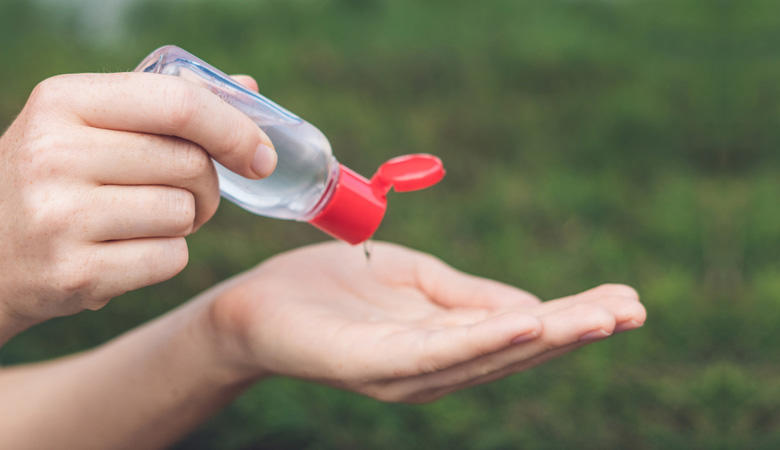
Hand sanitiser or sanitising wipes
According to numerous scientific findings, the dirtiest areas of a plane 2 are found right where you sit.
Your headrest, seat pocket, tray table, and seat belt are the worst offenders when it comes to harbouring germs and bacteria. Some estimates say you may be 100 times more likely to catch a cold 3 or other virus on a plane as opposed to ground transportation.
The last thing you want is to get sick before your trip even starts. Protect yourself from many types of bacteria, fungus, and some viruses by carrying and using hand sanitiser frequently during your flight. This is especially important before eating plane meals. Sanitiser wipes are great for wiping down your tray table, seat belt, and arm rests.
Airplane bathrooms don’t exactly make it easy to thoroughly and effectively wash your hands either. It’s also not certain that everyone does indeed wash their hands before exiting the bathrooms, meaning using the door latch as you exit can sadly reinfect your hands.
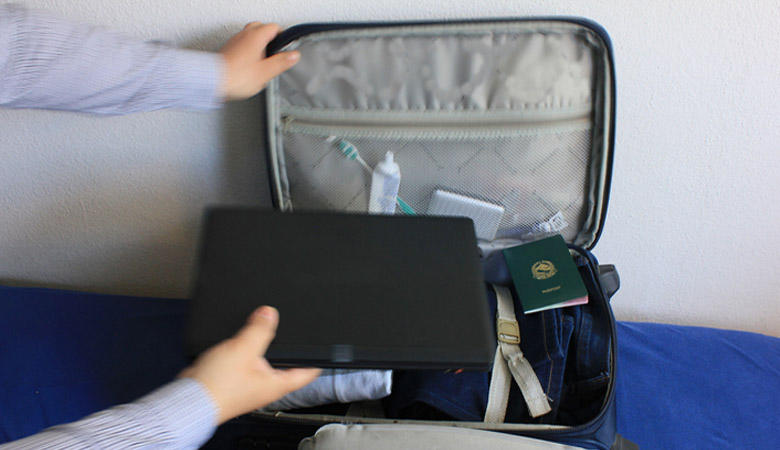
Valuables and fragile items
The only true way to protect yourself from items being stolen from your checked bags is to pack them in your carry-on instead. Avoid placing expensive jewellery, electronics, and camera equipment in your checked bags no matter what airline or airport you use.
Airports are fast paced businesses and there just isn’t always the time to provide the necessary care and attention that your bags deserve.
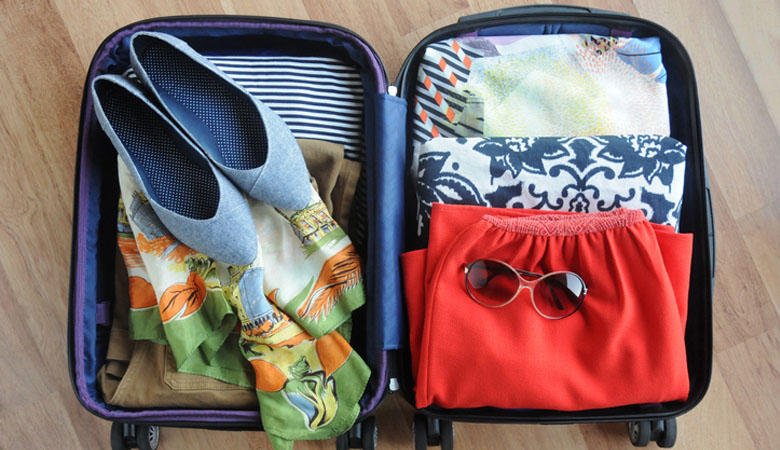
A spare change of clothes
If your checked bag happens to be one of the unfortunate ones to go missing, it pays to have a spare change of clothes in your carry-on at your disposal.
Most bags that don’t end up on the luggage carousel are usually recovered within 24-48 hours and will often be delivered directly to your hotel when they arrive at your holiday destination.
Having a spare set of clothes or two will allow you to make it through this period without having to go shopping. Keep in mind that clothing stores may not always be open or available, especially during special holiday periods.
There are many ways your bags can go missing including not making the flight with you when there is a quick connecting flight, being mislabelled and sent to the wrong airport, or general theft.
The main thing to do is not panic if your bags go missing. There are many things you can do to help recover your bags and having travel insurance may be able to help you to recover reasonable costs associated with buying essential items if your bags go missing for more than 24 hours.
It is also a good idea to have smaller children pack a spare change of clothes in their carry-on in case they happen to have an accident during the flight and require a change of clothes.
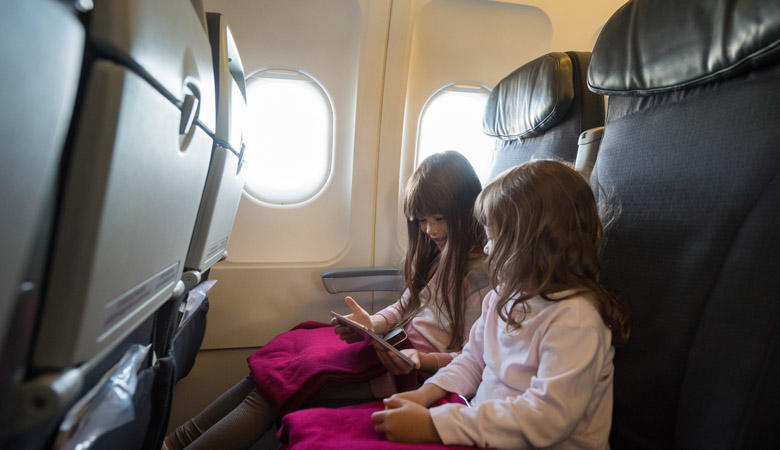
Entertainment
While most international flights are equipped with personal in-flight entertainment screens, they aren’t always guaranteed to work.
Bringing along a phone or iPad can be a lifesaver during long international flights or shorter domestic flights that don’t offer entertainment. Noise-cancelling headphones can drown out noisy passengers and engine noise, allowing you to get lost in a good movie or find sleep.
Free up weight and space in your carry-on by replacing actual books with digital ones. Downloading music takes up no extra physical space and can help you relax if you have a fear of flying.
Small children may find it difficult to use or reach their in-flight entertainment system. Bringing along a device they are used to, with games or videos they enjoy, can make the flight much more enjoyable for both them and you.
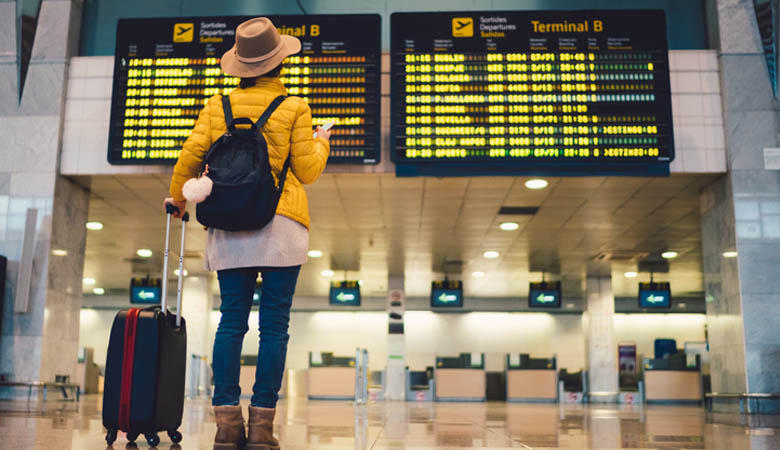
Final tips
When considering what type of carry-on bag to use, note that wheeled bags may provide more convenience but are often much heavier and offer less storage space than a backpack or duffel.
But, before you even begin to pull your bag out to pack, consider buying travel insurance. Travel insurance for your trip may prove to be the most important thing you take with you during your travels and it literally won’t take up any space.
Domestic Travel Insurance And Your Sports and Activities
13th July, 2021
If you’re a lover of adventure and always ensure there is a sport or activity in your travel itinerary, but never quite understood whether you were covered, and what coverage even meant for you, then we are here to break it down. Whilst our national border is shut, now is such a fantastic time to explore what this amazing country has to offer, but before you depart, don’t forget to pack domestic travel insurance. Please remember to check for any developments with domestic travel restrictions before booking your next domestic holiday.
What coverage for your sports and activity means for you when travelling domestically?
Our Domestic travel insurance policy covers a wide array of unforeseen events, but in the context of sports and activities, the following sections of our policy specifically applies; Section E: Accidental Death and Permanent Disability, as well as Section F: Personal Liability.
Section E: Personal Death and Permanent Disability
I know it is all a bit morbid, and the last thing you want to think about when booking adrenaline inducing activities, but there is always a level of risk in most things we do.
If whilst participating in the covered sport and/or activity domestically, and yourself, or any other party insured on our policy experiences an injury that within 12 consecutive months directly results in death or coverable permanent disability, you or your estate will be paid by us. We know this is heavy, so to lighten the mood, we are sure the most that will happen on your holiday is loss of pride.
Section F: Personal Liability
Sometimes, no matter how hard we try, we end up injuring someone else, or damaging someone else’s property, and this can occur when participating in a sport and activity. A good example of this is cycling; you may take all the precautions in the world, but if there is an accidental collision with a person, resulting in their injury or belongings, this is where this section could come into play.
Please note, exclusions do apply to all sections, which are easily identifiable in our Policy Disclosure Statement (PDS). In addition, Section E is not available for Bare Essential policy holders.
Medical:
No section of our domestic travel insurance policy provides coverage for medically related expenses incurred, as Medicare is in place for such events.
How to know if your pre-booked sport and activity is covered?
Our Domestic travel insurance policy provides coverage automatically to more than 40 sports and activities such as bungee jumping, cycling, parasailing and so forth. Please keep in mind though coverage is only available if you follow the safety guidelines when participating and when applicable you use appropriate and recommended safety equipment. We do have a table of covered sports and activities in the PDS, which also details which sections of cover apply but if your activity is not listed, cover is available provided it can be undertaken by persons of all ages and general health, as well as the activity not requiring specialised equipment or a high level of fitness.
How to know if your sport and activity is not covered?
There are some sports and activities that are not covered at all, and a list is available in the PDS to provide examples, but essentially the activity cannot be part of a competition or tournament, and the activity cannot be partaken on a professional basis. If you’re not sure, our customer service team is always available to double check for you.
Are Winter Sports automatically covered?
If you are planning to hit the slopes, you can purchase our add-on Winter Sports product, in addition to your domestic travel insurance policy. This product provides coverage for winter sports equipment, lift passes, piste closure and more. More information of this product is available within the PDS.
We hope this has at the very least provided a deeper understanding of how we can be there for you when it comes to sports and activities. If you still have burning questions, do not hesitate to contact us.
3 Hot Holiday Destinations to Escape Aussie Winter
30th July, 2018
If you find yourself with a case of the winter blues, then warm yourself up to the idea of booking a hot holiday to boost your spirits. While most of Australia may currently be suffering through the chill, the rest of the world is hitting the beaches and enjoying the dog days of summer.
Although you may be tempted by just about anywhere offering 30+ degree temps again, it pays to select a destination that is sure to maximise your fun in the sun.
So we’ve rounded up the top 3 hot holiday destinations that are sure to stop your shivering and give you some colour.
And remember: you may be able to escape winter but you can’t always avoid travel misfortune. Make sure to protect yourself with travel insurance in case your holiday in the sun has a few unforeseen rain clouds.
Portugal
Why not trade Australian winter for European summer by taking a holiday to Portugal?
July and August bring the hottest and driest weather Portugal sees all year, where you are almost certain to experience abundant sunshine nearly every day. With over 1700 kilometres of coastline, Portugal has no shortage of stunning beaches to choose from. You’ll find some of its most famous centred along the Algarve coast. Many polls rate Algarve as the top place to retire in the world and it’s not hard to understand why. Here you will find golden sands set to a backdrop of towering cliffs. It is a place where you can build sandcastles in the shadows of real life castles.
When you are done getting your fill of sunshine, head to one of several Michelin Star restaurants located not only in Algarve but across Portugal. You then have the Azores, an archipelago of nine subtropical volcanic islands located in the North Atlantic. Here you can sample delicious cuisine, work up a sweat hiking Mount Pico, search for migrating whales, or try your hand at paddleboarding. Dine on grilled limpets or try cozido, a traditional Portuguese stew that is cooked in volcanic soil.
Relax the day away in a soothing 40 degree Celsius geothermal pool infused with essential minerals. Geothermal pools such as the one found at Terra Nostra Garden have been used by locals since 1780. Of course you must visit Lisbon, the country’s capital, which consistently ranks as one of the top ten cities in the world.
It also lays claim to being one of the world’s oldest cities. It is a city made for lovers of architecture as well as foodies. Explore the city on its famous tuk-tuks or challenge your legs to climb the numerous hills of the city for breathtaking panoramic views at famous lookout points. Recharge your energy by sampling mouth watering chorizo or check out the city’s unbelievable bakeries. Lisbon’s architecture is a smorgasbord of historical landmarks mixed with modern contemporary design. See historic fairytale looking castles such as the Tower of Belém, numerous glorious churches, and the contemporary designed MAAT museum.
Lastly, for a splash of colour and true delight you must check out Sintra. The city has been recognised as a UNESCO World Heritage site and offers remarkable 19th century Romanticist architecture, royal palaces, castles, and lush gardens. It is easy to see why Hans Christian Anderson called Sintra the most beautiful place in Portugal.
Sri Lanka
Sri Lanka is a real gem of a holiday destination, so much so that it is even shaped like a jewel.
July to September marks what is known as the inter-monsoon season. It is a wonderful time to travel to the country as the beaches are hot and dry with only the occasional shower. It may be a rather small island country, but it packs quite a delightful punch. British colonial heritage combines with beautiful landscapes and friendly locals.
The country has often been long overlooked by tourists that choose to go to India or Southeast Asia instead. What this means for many travellers who choose to go to Sri Lanka is the ability to experience its many attractions and thousands of years of culture without mass tourism.
The coast enjoys a warm tropical climate while the inland hills offer an escape to cooler weather. Being an island, you are never very far from a beach that offers peaceful sunbathing, world class dive sites, and surfing.
Sri Lanka is perfect for wildlife lovers, offering numerous reserves where you can partake in a safari to witness rare and endangered species. The seas contain the world’s largest animal, the blue whale, while thundering herds of wild Indian elephants roam the land. National parks such as Yala and Wilpattu offer the chance to spot elusive leopards and sloths.
July offers the chance to witness the annual Esala Perahera Festival, allowing you to really dive into the local culture. See Buddhist temples such as Sri Dalada Maligawa, also known as the Temple of the Sacred Tooth Relic. Be sure to take in Sri Lanka’s Cultural Triangle where you will explore cities like Kandy, Anuradhapura, and Polonnaruwa.
Escape to the Northern Province for the ultimate seclusion and off the beaten path treasures.
Vietnam
You are sure to encounter high temps in Vietnam during the summer months of June-August. The key is to avoid the heavy rains that accompany it. While much of the country experiences its heaviest rainfall during this time, Central Vietnam experiences hot, dry weather until around September when the rains come.
Central Vietnam is quickly becoming recognised as a top travel destination with emerging cities such as Danang offering modern hotels and conveniences to travellers. It is here where you will find some of the country’s best beaches as well, including Non Nuoc Beach and My Khe Beach.
Explore the world’s largest cave in Phong Nha Ke-Bang National Park, or marvel at the many ruins and temples of the region.
If you’re travelling with your partner, check out the romantic riverside atmosphere of Hoi An. You’ll find a relaxing town with wonderful shopping, nearby golf courses, and the countryside landscape of Kim Bong Island. Hoi An’s pedestrian friendly streets makes it perfect to explore on foot. Taste authentic Vietnamese cuisine and be sure to check out the charm of Old Town.
Keen on history? Then take a day trip to explore Mỹ Sơn, a collection of over 70 Hindu temples and ruins.
Our guide to the best Great Barrier Reef experience
22nd August, 2018
Covering roughly 344,000 square kilometres, the Great Barrier Reef is the world’s largest coral reef system.
A national symbol of Australia, this great natural wonder of the world offers vital habitat for an abundance of marine life. The Great Barrier Reef has become one of the world’s most sought-after travel destinations. It is a living breathing ecosystem that offers an abundance of underwater recreation, some 900 idyllic islands, and extraordinary wildlife experiences.
Take a look at our helpful 2018 Great Barrier Reef Guide to start planning your own memorable Great Barrier Reef Experience. Pack your bathers and sunscreen, and dive into a truly unforgettable holiday. And don’t forget to buy travel insurance before you leave, you can get a quote and buy now on our website.
The Great Barrier Reef and why it’s so special
Declared a UNESCO World Heritage Site, the Great Barrier Reef is Earth’s largest living structure.
Just offshore the Queensland Coast, running from Bundaberg to the tip of Cape York, the GBR is home to some of the world’s greatest underwater adventures.
Due to the reef’s easy accessibility, nearly 2 million people visit the GBR annually. Visitors flock to the reef to experience the vast array of marine life the reef supports as well as to relax in year-round beautiful weather.
Reefs protect coastlines from being severely altered by tropical storms and provide essential nutrients for the marine food chain to function. Due to the fact so many species of fish spawn and grow up in the reef, it is also vital to the local fishing industry.
The Great Barrier Reef is not a single reef, rather it is made up of thousands of smaller reefs. The islands and sandy cays within the reef provide some of the most spectacular maritime scenery in the world and create a complex natural ecosystem with a rich biodiversity.
These are just a few reasons why we need to protect the reef and we have yet to fully understand all the many benefits the reef has to offer.
Visiting the Great Barrier Reef
Experiencing the reef by air or sea is easy, with hundreds of tour operators at your service.
Most visitors looking to experience the reef will fly into Cairns but you can catch flights to other coastal cities offering reef access as well as direct flights to GBR islands such as Hamilton Island from Sydney, Melbourne, or Brisbane.
Enjoy easy access to the Whitsundays from Airlie Beach or take the ferry from Cairns to Fitzroy Island. Places like Mission Beach and Townsville offer great day trips to the reef as well as extended journeys. Visit Port Douglas to experience the incredible Daintree Rainforest in addition to the numerous Great Barrier Reef experiences offered.
How you decide to experience the reef is as varied as the destinations that act as bases for your explorations.
Snorkel and dive tours offer the best way to fully immerse yourself in the living reef, offering up close and personal experiences with its abundant marine life.
Those not comfortable diving beneath the surface can opt for a glass-bottomed boat tour. These tours allow visitors to travel over shallow reefs where they can spot all kinds of corals, fish, sea turtles, and giant 100+ year-old clams without getting their feet wet.
Choose from several different boating options including lavish yachts, cruise ships, and romantic sailboats. In fact, liveaboard boat tours are great for venturing deep into the reef where you get to spend several days to weeks exploring numerous islands and dive sites. Enjoy your own private cabin, spacious decks, WiFi, catered meals, and knowledgeable guides.
Those prone to sea sickness can choose to take a scenic helicopter or seaplane flight over the reef, taking in the famous Heart Reef and Whitsunday Islands.
Flights over the reef usually include stopovers on a remote island or coral cay where you can enjoy lunch and explore the shoreline.
You can also find unique Seawalker experiences as well as submarine adventures.
Must see islands
While visiting every Great Barrier Reef island would take several visits, many of its most notable islands can be experienced during a single trip.
GBR islands offer a wide range of accommodation options including beachside bungalows, lavish 5-star resorts, and adventurous campsites. Here are some of our favourite must-visit Great Barrier Reef islands.
- Fitzroy Island: A mountainous rainforest oasis, Fitzroy Island is a national park that is easily reached by a 45-minute ferry from Cairns. Teeming with wildlife both onshore and in the surrounding reef, Fitzroy offers many water-based adventures, great hikes, and the chance to visit the Turtle Rehabilitation Centre. The Fitzroy Island Resort offers accommodation options ranging from campsites to deluxe suites.
- Lizard Island: Australia’s northernmost island resort, Lizard Island is a pure tropical paradise with its two dozen white-sand beaches. Named by Captain James Cook for the numerous monitor lizards found on the island, Lizard Island is also home to a Great Barrier Reef research station and luxury resort. The resort offers trips to the world-famous Cod Hole dive site.
- Green Island: This tropical cay is just a short trip from Cairns by way of ferry, charter boat, helicopter, or seaplane. This rainforest-covered cay is rather small, making it great for day tours. Experience a variety of birdlife, exotic plants, and great snorkelling sites.
- Heron Island: This small island in the southern GBR can be accessed from Gladstone on the mainland. You will find 10 dive sites within 15 minutes of the island, making this a great option for divers and snorkelers. The island is home to a resort that offers a rare chance to log off from the real world as it offers no TVs, no mobile phone coverage, and limited internet.
- Hamilton Island: The only GBR island with a commercial airport, Hamilton Island can be reached by direct flights from Sydney, Melbourne, Brisbane, and Cairns. Located in the heart of the beautiful Whitsundays, Hamilton Island is a year-round holiday hotspot. If you’re looking for a single island the whole family can enjoy, then Hamilton is your type of island. The island offers a wealth of accommodation options and exciting activities to take part in. Take a day trip to the famous Whitehaven Beach, dine at award-winning restaurants, paddleboard off Catseye Beach, book a fishing charter, play a round of golf, or simply relax in a world-class spa.
Best wildlife experiences
The Great Barrier Reef is an underwater Serengeti that offers incredible marine safaris found nowhere else.
The reef is home to microscopic plankton all the way up to giant humpback whales which migrate from Antarctic waters to breed here. The calm waters provide critical habitat for endangered marine life such as dugongs and six species of sea turtles that come ashore throughout the reef to lay their eggs.
Feel what it’s like to be a marine biologist as you witness the world’s largest collection of corals and be captivated by tropical fish of every shape, size, and colour.
Play a version of “Where’s Wally” as you try to spot Nemo, the adorable clownfish, amongst more than 1,500 species of fish.
Swim with giant manta rays, with their 7-metre wide wing-like fins, off Lady Elliot Island and search for dozens of shark species. Most sharks in the reef are harmless and include the white-tip and black-tip reef sharks.
As you snorkel or scuba dive the reef, you are almost guaranteed to make new friends like the Maori wrasse and potato cod who are all too eager to follow you around out of curiosity.
Even above the water you can spot wildlife as you cruise alongside bottlenose and spinner dolphins in the Whitsundays or scan the horizon for migrating minke whales.
Come Oct-Dec, love may not be in the air but it will definitely be beneath the waters of the reef. Mass synchronised coral spawning takes place after sunset and offers up a magical underwater snowstorm that lasts up to a week.
Above water, hundreds of species of birds including sea eagles and frigatebirds visit or breed on the reef’s beautiful islands.
Take a guided tour to watch sea turtles lay eggs and even witness the baby turtles hatching at the Mon Repos Turtle Centre during the turtle nesting season.
In addition to the abundant Great Barrier Reef marine life you’ll spot, the Far North Queensland mainland offers the chance to spot giant flightless cassowaries, tree kangaroos, saltwater crocodiles, and vibrant tropical butterflies.
The future of the Great Barrier Reef
The Great Barrier Reef Marine Park protects a large area of the Great Barrier Reef from harmful activities.
Although tourism, fishing, and recreation are allowed in the park, all activities are strictly regulated so as to minimise harmful impacts.
Permanent anchorage points have been established along with boating speed limits to lessen the damage to the reef.
The Great Barrier Reef has suffered recently from coral bleaching brought on by climate change as well as cyclic outbreaks of the crown-of-thorns starfish.
but fortunately, it was recently announced that the Great Barrier Reef Foundation would receive a $444 million grant to aid in reef recovery and protection efforts. Nearly 20 years running, the foundation has managed to raise $90 million for reef projects that go to the heart of saving coral reefs and the animals that depend on them.
They work closely with Australia’s leading scientists from organisations like CSIRO as well as the Great Barrier Reef Marine Park Authority.
And although nearly 90% of the Great Barrier Reef shows evidence of bleaching, it remains better off than most other coral reef ecosystems around the world thanks to effective protection and management strategies.
Looking to the future, the Australian government is devoted to making the reef more resilient to climate change as well as decreasing catchment run-off and loss of coastal habitats from development.
Protecting the reef is essential to make sure future generations can enjoy the Great Barrier Reef experiences we have today. It is also vital for the local communities that depend on them.
By continuing to show support for the reef through donations and tourism, we can hopefully keep the reef alive and well-preserved for generations to come.
Things to pack in your carry-on for health and comfort on flights
16th of January, 2020
You may go to great lengths to secure comfortable accommodation and get your required immunisations for your holiday, but how much time do you spend thinking about your comfort and health during flights, particularly long-haul flights?
It’s a well-known fact that planes are a hotspot for germs and viruses, and unless you’re lucky enough to be in First or Business Class it can be difficult to find comfort. Thankfully there are ways you can improve the level of comfort you experience on flights and ways to reduce the chances of you starting of your trip getting sick.
We have created a comprehensive packing list for what you should include in your carry-on the next time you travel.
The list includes many small and lightweight items that won’t take up too much space but can make a world of difference when it comes to your comfort and health. Before you begin packing for your next holiday, be sure to purchase travel insurance.
Having a safety net you can rely on in case your travel plans don’t go smoothly will help you rest easy on your next flight knowing you’re covered for many of things that the unpredictable world of travel can throw your way.
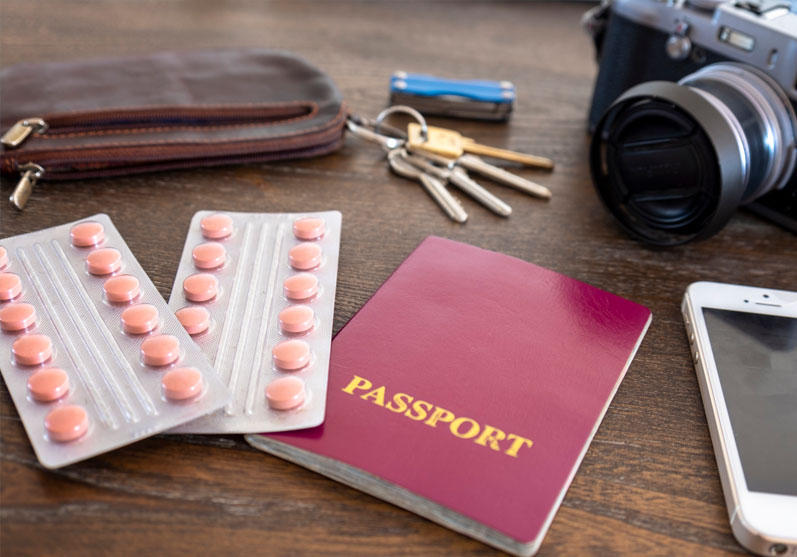
Medications
The most important items to pack in your carry-on luggage are all your necessary medications.
Whether you require medication for conditions like diabetes or high blood pressure, having your medication available throughout your flight could potentially save your life in extreme cases. For instance, if you are prone to severe allergies which may pose a risk on flights, be sure to carry an EpiPen. Don’t forget to also pack an extra pair of eyeglasses and several pairs of spare contacts in case they become damaged or lost during the flight.
Even if you won’t need to take your medication during the flight, it’s always safer to pack your medicines in your carry-on in case your checked luggage is lost or delayed. Be sure to also pack any OTC medications you think you may need since some medications may be hard to come by in certain countries. Always talk to your doctor before your trip to make sure your prescribed and OTC medications will be allowed in the country you are travelling to, as there may be restrictions relating to certain drugs.
Always pack more medication than you think you’ll need for your trip in case you face travel delays caused by instances such as cancelled flights or natural disasters. Be sure to declare all of your pre-existing medical conditions when purchasing travel insurance as failing to do so may void your policy or result in certain claims being denied. InsureandGo considers all pre-existing medical conditions, and many conditions may be covered free of charge.
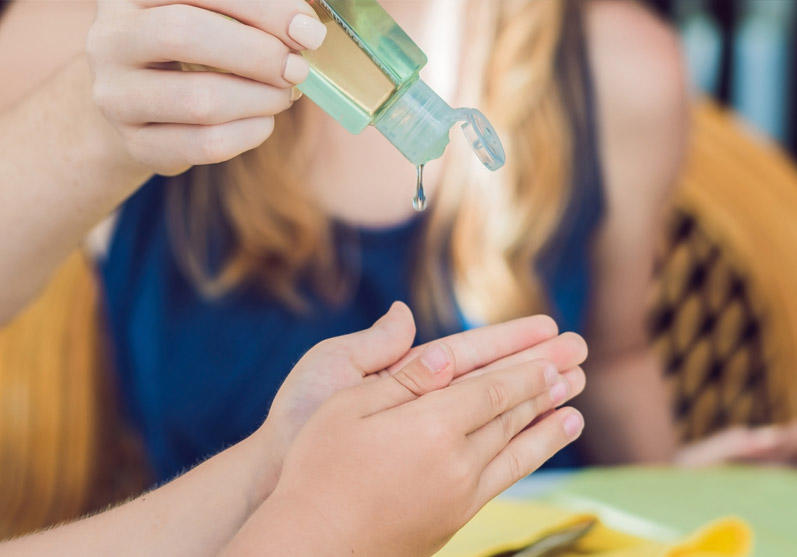
Hand sanitiser or sanitising wipes
You have probably heard that planes aren’t exactly the most hygienic places.
While some areas of planes may be cleaned between flights, many areas are left untouched for quite some time. A number of studies have shown you are much more likely to catch a virus on a plane than when taking ground transportation. Somewhat frighteningly, many of the dirtiest spots on a plane are right where you sit. Items like your tray table, personal entertainment screen, seat belt, seat pocket, and in-flight magazines have been shown to have high concentrations of germs and bacteria.
While you can’t demand that an airline clean the entire plane before your flight, you can carry a travel-size bottle of hand sanitiser and sanitising wipes to do your quick clean of your area. Simply wiping down the items you will come into contact with most frequently during your flight can reduce your chances of being affected by things like viruses and varieties of fungus.
Aeroplane bathroom sinks aren’t that effective for properly washing hands, therefore it pays to carry sanitiser that you can use when you return to your seat. Be especially vigilant about sanitising your hands before digging into your in-flight meals and snacks.
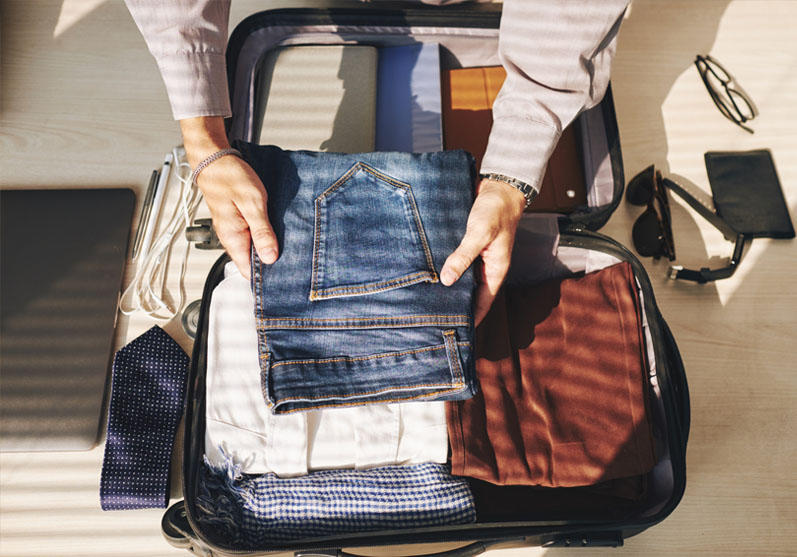
Spare change of clothes
Packing a spare change of clothes in your carry-on is not only a good idea in case your checked luggage is lost or delayed, but it can also come in handy for instances where something is spilled on you or you suffer an accident. Running around an airport can also force you to break a sweat, and having a spare change of dry clothes allows you to slip into something drier and more comfortable for your flight.
Remember to pack a spare change of clothes for your children as well, since children are more prone to spills and accidents. Women will want to make sure to pack any sanitary items they may require during the flight and nursing women may wish to have a few spare dry shirts they can slip into if necessary.
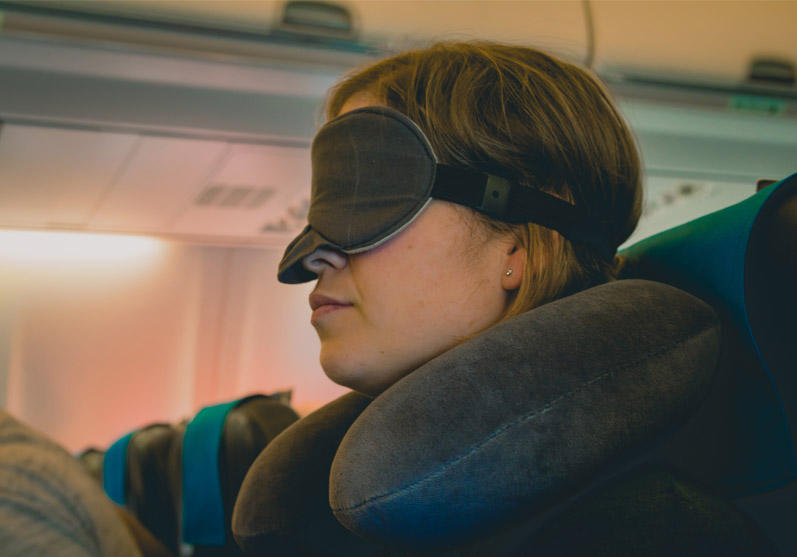
Neck pillow
Unless you’re seated in First or Business Class, falling asleep on a plane can often seem futile.
The pillows supplied by airlines aren’t exactly the most state-of-the-art things to rest your head on so it is usually wise to bring your own. Neck pillows specifically designed for flight travel come in just about every shape, size, and colour imaginable these days. Styles include the classic u-shape, the infinity design, the complete wrap-around, and even one that winds across your body much like a seatbelt.
The key is to try out and select a neck pillow that both fits you and feels comfortable. What works for one person may be useless to another, therefore purchasing a neck pillow online without trying first can be risky. You of course want a pillow that offers good neck support and one that isn’t too cumbersome to carry onboard with you. Some neck pillows can be rather bulky while others are inflatable and pack away quite easily when not in use. Some even have built-in massagers for even more added comfort during your flight. Some also come equipped with zippered pockets in which you can store items like eye masks and earplugs which are items we will discuss further in a moment.
Getting a good rest during a flight allows you to not have to make your way through customs or baggage claim feeling and looking like a zombie.
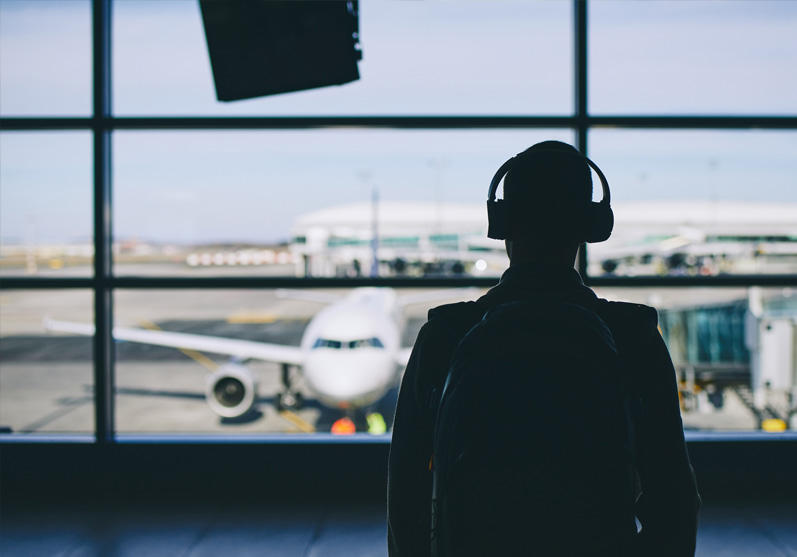
Earplugs and noise-cancelling headphones
Increase your chances of falling asleep even further by packing some quality earplugs or noise-cancelling headphones. Both can help drown out plane engine noise and nearby crying babies. Some earplugs are the basic disposable type often given out to some passengers of certain airlines, while others are more durable and reusable with their own handy storage case.
Disposable varieties are good for the fact they minimise the chances of ear infections. If you decide to use reusable varieties, be sure to clean or disinfect them often to avoid ear infections. Ear plugs are designed using a variety of materials including silicone, PVC foam, and polyurethane. In addition to blocking out sound, certain earplugs are specially designed to help relieve discomfort relating to air pressure differences while flying.
Noise-cancelling headphones can also block out unwanted sounds but also have the benefit of introducing soothing sounds. Anxious flyers can download helpful meditation apps or calming music to help ease their anxiety and stress.
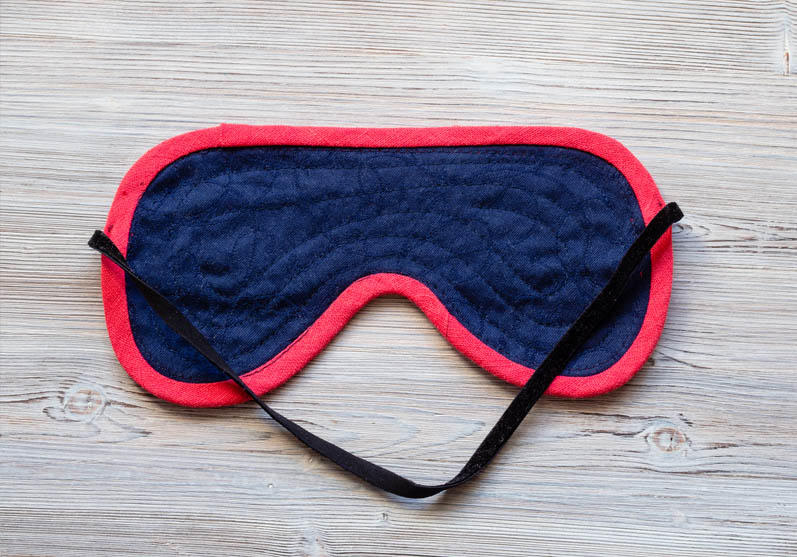
Eye Mask
Many people require total darkness in order to fall asleep and this can be hard to come by on daytime flights and even overnight flights where planes are usually lit up with passenger entrainment screens and safety lights.
Ensure darkness and give yourself a better chance to fall asleep by packing an eye mask. While the cheap wafer-thin masks are uncomfortable and do little to block out all light, there are more quality masks available that conform to the shape of your head and completely block out everything. Some are designed to work well with those wearing makeup and others are made of materials that are safe for sensitive skin.
When shopping for a mask, look for one that is breathable and doesn’t put too much pressure on your eyes or the bridge of your nose. You also want a mask that will stay in place when you move around. Masks can also be useful for flyers suffering from autism who experience visual sensitivity.

Lip balm and lotion
An airline cabin is a very dry environment, with humidity levels commonly well below 20%. To avoid your skin drying out, be sure to pack travel-size bottles of your favourite face and hand moisturisers. You’ll also want to carry a lip balm, moisturizing eye drops, and possibly a nasal spray if you are prone to these areas drying out easily.
Staying hydrated during your flight will also go a long way to preventing your skin from drying out. Aim to drink at least 200-250 mL of water every hour you’re in the air and avoid consuming alcohol. Staying hydrated will aid your body’s immune system to function properly.
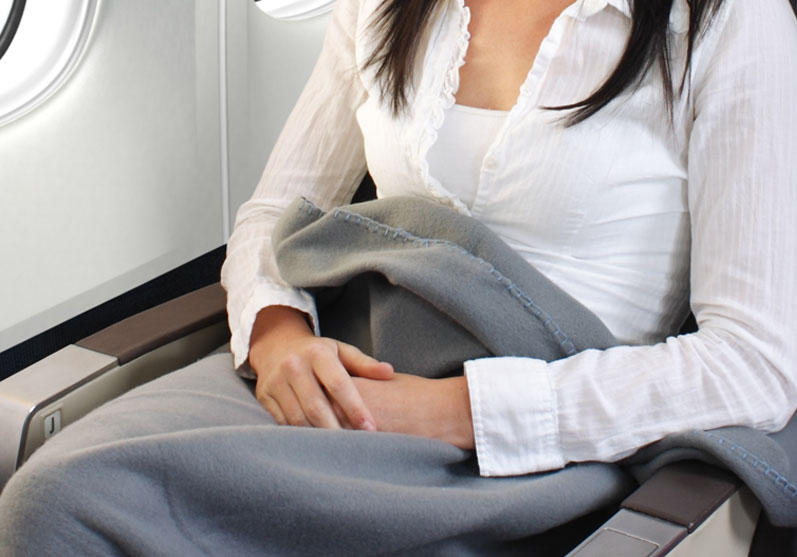
Blanket or light jacket
Many passengers find it to be rather chilly during flights, making it wise to always pack a light jacket or blanket.
While some airlines may provide free blankets, there is no guarantee that there will be enough available and you don’t exactly know how or when they were last cleaned.
Plane cabin temperatures are in fact not that cold, with the average temperature usually being kept around 23°C. This can seem colder since you are usually seated and aren’t moving around much to generate heat. One reason why planes are kept on the cooler side is that it helps avoid passengers fainting from hypoxia, which is sometimes caused when body tissues are deprived of oxygen. Cooler temperatures can also help to prevent motion sickness.
Simply put on that extra layer you packed in your carry-on and be thankful that you don’t have to face the temperatures that are often present on the outside of the aircraft during a flight which can reach as low as -50°C.
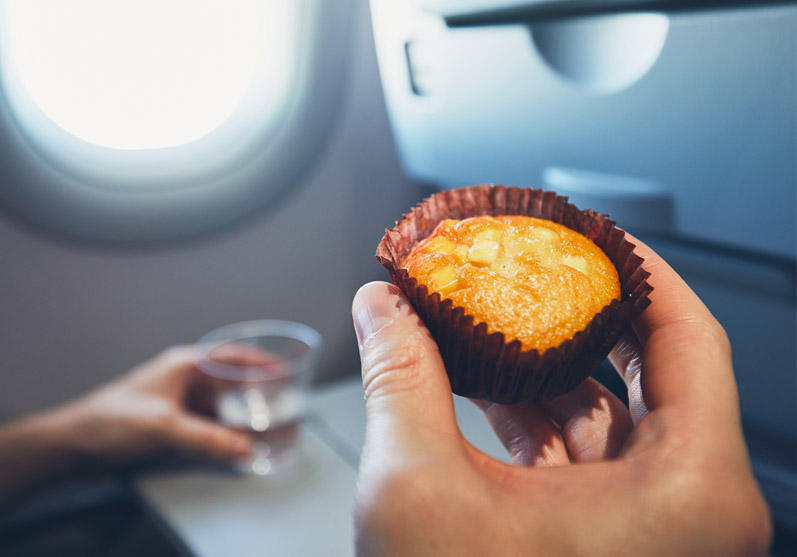
Snacks
While many domestic flights across Australia are short trips, our international journeys are often long-haul affairs.
Spending upwards of 15-17 hours on a plane provides a lot of time to get hungry. It’s always wise to pack a few of your favourite snacks to keep your cravings under control. Food can act as both energy and comfort.
It is also wise to pack your own snacks if you have specific allergies and aren’t certain the airline will be able to provide you with snacks that are safe for you to consume. Even if you get hungry on shorter flights, it pays to bring your own snacks since food items usually carry a much higher price tag when purchased from the airline.

Compression Socks
Some passengers may be at a higher risk of developing DVT or deep vein thrombosis.
Sitting in cramped spaces for extended periods of time can lead to the formation of blood clots in your legs. Those who are commonly more susceptible to this condition include older individuals, those who are considered overweight or obese, and those with circulation problems.
You can reduce your chances of developing DVT by wearing compression socks, which help prevent clots by gently forcing your blood to keep moving through light pressure. They’ll also help keep your feet and lower legs warm during the flight.
These Common Travel Fails Prove the Importance of Having Insurance
11th of November, 2019
We’ve all encountered travel mishaps on the road; either the airline losing your luggage, or a nasty case of food poisoning, or you’re stuck in a foreign country because your passport has been stolen.
There’s nothing worse than being hit with a travel fail when you’re trying to enjoy your holiday, but they do happen, and it’s important to remember that we’re not always untouchable when travelling abroad.
It’s very easy to think that we’re invincible, and Bali Belly will never happen to you! We have created stories below and although these stories were not sourced from real customers; they are based on real-life scenarios that happen to Australian travellers every day.
We have created them to highlight the importance of always travelling with insurance, because you may need it for a diverse range of travel fails”..
Jasper was locked in his cabin for a whole 7-day cruise
“Last time I’ll ever fess up to being sick on a cruise. After seeing the cruise nurse for what I thought was sea sickness, and then being told I had the flu, I ended up in quarantine and wasn’t allowed to leave my cabin for essentially the whole 7-day cruise.
While my mates were out island hopping across Noumea, Fiji, and Vanuatu, I was watching movies on repeat, and squinting out at the scenery from a port-sized circular window – I could have at least been confined to a balcony room! My mates were good enough to bring down buffet food, though weren’t super keen on keeping me company in my germ-infested room. Zero refund from the cruise company, though at least travel insurance kicked in – who knew cabin confinement was even a thing!” – Jasper Thomas
We hear about outbreaks of gastrointestinal illnesses on cruise ships a lot in the news, and should an outbreak occur on your cruise, you’ll likely be quarantined to your cabin to prevent the illness from spreading to other passengers. It’s not an ideal situation, but norovirus spreads quickly in enclosed spaces like a cruise, where large numbers of people are touching the same hand railings, eating from the same buffet, and using the same bathrooms, so it’s a necessary precaution. The best way to avoid sickness on a cruise is good hygiene – wash your hands before eating, and travel with a bottle of hand sanitiser for use after you have touched public spaces like handrails, door handles, or elevator buttons.
If you are confined to your cabin for medical reasons as advised by a ship medical officer, Cruise policies will pay up to $75 for every 24 hours a passenger is confined up to the defined amount outlined in the table of benefits in our Silver and Gold cruise policies.
Casey got bitten by a snake in Arizona
“It was THE scariest thing – we were out hiking up Camelback Mountain, which is a pretty popular hiking spot in Phoenix (as everybody does it, locals jog there in the morning kind of thing) – And I was really enjoying my hike. Then all of a sudden I got bitten just under my knee by something that felt like a bee sting. My friends were freaking out because they’d seen me step on it – it was a massive rattlesnake, but it had been so well camouflaged that I just didn’t see it.
It happens so fast that you just go into shock, and don’t really believe that something that serious has actually happened. There wasn’t any real pain or swelling, and I wasn’t throwing up or dizzy or anything, so I would have been happy to keep on hiking, but I guess I got really lucky – by the time we got to the hospital they told me it was a dry bite which meant the snake hadn’t actually injected any venom. That said, the puncture wound was still pretty impressive.
You wouldn’t believe how much money an emergency ambulance and being in a hospital in the US would have cost me – and then supposedly if I had actually needed antivenom that alone would have been $14,000 USD!!! There is no way I would have afforded that without insurance to cover me.” – Casey Avery
Medical care in the United States is among the most expensive in the world, and when it comes to treating snakebite, the costs of being treated can leave you with a debt in the hundreds of thousands. Kaiser Health News recently reported on a 9-year-old whose parents were sent an outrageous $142,938 bill for an air ambulance and four vials of antivenom. If you become ill or injured while overseas, medical insurance can pay for some or all of the costs that accumulate when you receive medical treatment.
Thea got stuck in the Solomon Islands for 5 days, without insurance
“I actually didn’t have travel insurance, which sucked massively, though fortunately, I managed to bunk down in a hotel room with a friend who was covered so I didn’t have to pay out of pocket.
We had just spent 9 days in the Solomons, which was epic – it’s such a beautiful country – but our flight home got cancelled due to weather. Fine – you usually just have to sit in the airport until it gets rescheduled, though flights from the Solomons only fly out on Tuesdays and Thursdays. We were supposed to fly out on a Thursday, and our cancelled flight meant that the next one wasn’t until 5 days later. While the airline rebooked us onto the Tuesday flight, we had to scramble for what to do and where to stay for another 5 days; not overly terrible being stuck on a tropical island, but when you haven’t budgeted for it, 5 days of food and accommodation put a massive hole in your pocket. I had to do some serious grovelling to be able to share a room with my best friend and her boyfriend, and won’t be travelling without insurance ever again! I don’t think the boyfriend appreciated my third-wheel presence.” – Thea Lee-Smith
According to Flightstats.com, 7,400 + flights are cancelled every week around the globe, for reasons that vary from inclement weather to security, mechanical issues, and even missing crew. The good news, though, is that you can potentially get some money back from your travel insurance. The funds can go towards essential items caused due to the delay, such as meals or toiletries you’ve had to buy because you’re stuck at the airport or even something like transit accommodation.
“A monkey stole my mobile phone”
“Legit – I’m not even kidding. I was in Hau Hin in Thailand and a monkey stole my mobile phone. It was locked in my hotel room, but he broke in through the window, went through my stuff, and ran off with my phone!! It sounds like the beginning of a Hangover movie, but the room was absolutely ransacked – I had heard of monkeys snatching glasses and money off people, and ripping out people’s jewellery, but had never heard of them breaking into hotel rooms!
“I ended up having to spend a whole day filing a police report, changing my passwords, and organizing a new number. At least insurance covered the cost of the replacement. I would say that it did really help at least having had a backup of my contacts” – Amy Wilson
According to the Australian Mobile Telecommunications Association (AMTA), 100,000 Australian mobile phones are lost or stolen every year. InsureandGo will pay up to the amount shown in the table of benefits for the cost of replacing your personal belongings if lost, stolen or damaged during your trip. Even by monkeys! We pay for items owned (not rented), though in the case of mobile phones, please see the table of benefits for the sub-limits which, dependent on the level of cover you have selected, may apply. To successfully claim a stolen mobile phone, you will need to supply the IMEI (International Mobile Equipment Identity), block the IMEI number (by Australian telecommunication providers) of the stolen or lost mobile phone device and make sure for stolen items you will need to immediately report it to the overseas police.
Best Places to Visit in Australia This Winter
Australian winters offer some of the best holiday opportunities in the world. With the versatility of cold climates in the south and warm weather in the north, there are endless Aussie possibilities for your upcoming winter escape!
1. The Mornington Peninsula, Victoria
The Mornington Peninsula is a glorious region where scenic beauty and fabulous food and wine roll into one.
- Winter in the Mornington is home to the Winter Wine Festival, the Winter Solstice Festival and the Mornington Jazz Festival. Consider timing your trip to attend one of these!
- Popular winter activities in the region include wining, dining, golfing, shopping, art exploring and hot-spring dipping. Aim to book in advance where possible.
- You can easily get to the Mornington via car, rail, bus, ferry or organised tour. If travelling by car during times of ice or snow, be careful on the roads and prepare your vehicle/tyres accordingly.
2. Montague Island, New South Wales
Ever wanted to snorkel with seals? On the south coast of NSW, Montague Island is just a short boat trip from beautiful Narooma.
- One of the key highlights of Montague is its colony of around 1,000 Australian and New Zealand fur seals, and a visit here allows you to swim with them!
- Going on a snorkelling tour is the best way to get to Montague Island. Check with chosen your tour company to make sure all gear is provided.
- Consider staying overnight on the island at the Lighthouse Keepers’ Cottages. You can book up to 12 months in advance here and a 2½ hour island tour is included.
- On the island, there are also plenty of opportunities for whale watching, bird watching and fishing tours, as well as scenic walking and picnicking.
3. Falls Creek, Victoria
Falls Creek is Victoria’s biggest alpine resort and if you love the thrill of cross-country skiing, this is the place to be! There are opportunities to ski, snowboard and toboggan, and you can take advantage of 65 kilometres of cross-country trails.
- Falls Creek is just over 4 hours drive from both Sydney and Melbourne; from other areas, you can fly into Albury and then catch ground transport to the area.
- Best time to visit: June to October – it’s a good idea to check the snow forecast in advance.
- Accommodation ranges from luxury resorts to cheaper lodges, so you can choose something to fit your budget.
- Both beginner and advanced ski lessons are available, with classes for kids and adults. A great option if you want to learn or enhance your skiing skills.
4. Kakadu National Park, Northern Territory
Can’t wait to escape the cold? Heading to the Northern Territory in winter will put you in the heart of the dry season (May – October), one of the best times to visit the famed Kakadu National Park.
- There are endless things to do in Kakadu, from bushwalking and camping to scenic flying, boat cruising and crocodile spotting.
- Jim Jim Falls and Twin Falls are two iconic sights here; you can visit these on your own (you’ll need a 4WD) or book yourself on a tour.
- Temperatures during winter range from around 20-30ºC in the top end, but keep in mind that some nights can be cooler and some days can be hotter.
- If you’re combining Kakadu with a visit to Darwin, consider timing your trip to coincide with the Garma Festival (July-August) or the Darwin Festival (August).
5. Hobart, Tasmania
Festivals might be hard to come by in the Aussie winter, but not in Hobart. Two key music events will mark the Tassie winter in 2015 – Dark Mofo and the Festival of Voices.
- Dark Mofo is a celebration of all things Winter Solstice, with cool performances, decadent feasts and amazing fire and light shows. The 2015 Winter Fest runs from June 12 to 21.
- The Festival of Voices is the ultimate musical experience that transforms Hobart into a ‘Singing City.’ Moving concert performances and educational workshops will run from July 3 to 12, 2015.
Winter is celebrated during the festival with a Candlelight Procession through the city, followed by the lighting of the Festival Bonfire. Don’t miss it!
6. Whitsundays, Queensland
Sounds more like a summer trip, doesn’t it? But the Whitsundays can offer keen travellers the perfect getaway during winter.
- Temperatures in the Whitsundays average around 22-25ºC during winter, meaning you can soak up the Queensland warmth without having to worry about the blistering heat and humidity.
- The warm tropical waters of the Whitsundays stay around 25ºC throughout winter, making it ideal for swimming and other water activities.
- Whale spotting is also common from June onwards when humpback whales migrate north. The whales often choose to give birth in the shallow waters, so you might even see a calf!
- Heading to the Whitsundays in winter also means that you can save on off-peak pricing and avoid the heavy crowds that flood in during the spring and summer.
With winter fast approaching and the great Down Under at your fingertips, there’s only one question: What’s your next winter escape going to be?
Travel Insurance Checklist – Tips on Choosing the Right Cover
Getting the most out of your travel insurance is all about having the right policy to begin with, but it can be a little overwhelming trying to determine which level of cover is right for you. We have put together some tips that may be useful when determining your travel insurance cover:
Destinations: Are all my destinations covered?
This is easy to determine if you’re going on a single-destination holiday (e.g. Paris), but if you are travelling to multiple destinations, ensure they are all covered. Your destinations should include anywhere you choose to stop over (even for just one night) or any places that you might visit as part of a cruise trip or tour.
Medical: Do I have the right level of medical cover?
It is important that you understand how much coverage you have and under what circumstances the medical cover applies. If you’ve got a pre-existing medical condition, you’ll also need to confirm that this doesn’t exclude you from the cover you want to buy. You should also gain a clear idea of what excesses you will be required to pay before your medical cover kicks in.
- Read more about cover for pre-existing medical conditions here
Personal Belongings: How much of my baggage & belongings are covered?
Most travel insurance policies will provide some level of cover for your personal belongings. The key lies in knowing how much you are covered for – e.g. $500 or $5,000 – and if this enough to protect all of your baggage and belongings. If not, you may want to change your policy or consider upgrading for specific items.
Valuables: Am I taking any valuables with me?
You should never assume that any valuables will be automatically covered by your insurance policy. Common items like passports, phones, laptops, cameras, tablets, sunglasses and jewellery are often excluded from cover, particularly when it comes to the lower-level/basic policies. Make sure you read the Product Disclosure Statement to gain an understanding of whether your valuables are protected and under what circumstances you can make a claim.
Sports & Activities: If I’m injured (or fall ill) while partaking in certain activities, will my insurance cover me?
Certain activities, like motorcycling or white water rafting, mean there is a higher risk that you could become injured while on holiday. Hence, you should check whether your policy covers you for the specific activities you will be engaging in and what the terms and conditions of these activities are (e.g. if you are scuba diving, you may only be covered to a certain depth).
Cancellations: If I have to cancel my trip, do I want my money back?
Things don’t always go according to plan, and there may be some unexpected events that require you to cancel your trip. If you do, you’ll need to check that cancellation is part of your travel insurance policy. If you have the right cover, you may be able to claim lost funds from cancelled flights, accommodation, car hire, tour bookings and more. Your policy should tell you the maximum amount of money that you can claim.
Limits/Excesses: How much money do I want to pay before I can claim?
Most insurance policies can include excesses. This means that if your excess on lost baggage is $100, for example, you’ll be responsible for covering the first $100 of your losses before your insurance company will begin paying you. If you want to keep your excesses low; consider purchasing a higher level of cover or choose to waive your excesses altogether by paying a higher premium.
Exclusions: Do I understand what’s excluded from my policy?
Exclusions are a mandatory part of any insurance policy and reading your Product Disclosure Statement carefully before you purchase should give you a comprehensive view of what isn’t included in your cover. You should make note of any specific events or items that are excluded from your policy, as well as any circumstances or situations that automatically mean your losses will be excluded.
- Read about common excluded circumstances and situations here
Keep in mind that this checklist isn’t meant to be a definitive list when deciding on which travel insurance is right for you. Instead, it should give you an idea of the main areas you need to be considering when determining and purchasing your policy. If you are uncertain about any area in your travel insurance package, make sure you read the Product Disclosure Statement (PDS) or contact our customer service agents before you buy to understand your options.
Understanding the Different Levels of Cover at Insure&Go
Insure&Go offers three different levels of travel insurance cover for you to compare and review, based on the needs of your trip.
Bare Essentials
‘Bare Essentials’ is the simplest level of cover available at Insure&Go. Bare Essentials provides basic cover for:
- Medical and emergency expenses (but not hospital expenses)
- Baggage and belongings (but not valuables, like passports, mobile phones, tablets, cameras)
- Personal liability
You should keep in mind that Bare Essentials does not cover trip cancellations, hospital benefits, valuables and travel or baggage delays.
If you require a more inclusive level of cover, it may be in your best interests to upgrade your insurance to the Silver or Gold package or consider a specific sports, business or valuables upgrade only.
Insure&Go Silver
The ‘Silver’ package provides more comprehensive travel insurance cover for your trip. It is considered the next level of cover up from ‘Bare Essentials.’
The Silver package includes:
- Medical and hospital cover
- Trip cancellations and delays
- Loss or delay of baggage/belongings
- Valuables cover, including items like money, passports, phones, laptops
- Cover for personal liability and legal expenses
- Loss of income
- Rental vehicle excess waiver
The Silver level of cover is ideal for those who want a little more than just the basic cover.
Insure&Go Gold
The ‘Gold’ package is the most comprehensive level of cover offered by Insure&Go.
The Gold level of cover is similar to the Silver, but goes a step further to offer:
- Higher levels of cover in each insurance area (e.g. $50,000 instead of $15,000)
- Cover for the costs of returning home due to an emergency and the costs associated with resuming your trip overseas
- Compensation for additional areas, such as ongoing pet care if your travels are delayed
The Gold package has been designed to bring travellers the most comprehensive policy^ available at Insure&Go.
Unsure which level of cover you need? You can compare each travel insurance option by reviewing the areas and limits offered and the excesses payable.
For all of the packages above, Insure&Go can also provide you with additional upgrades for valuables, winter sports, business equipment and even golfing equipment.
For full details on each level of cover make sure to read the Product Disclosure Statement (PDS) or contact our customer service agents before you buy to understand your options
7 Essential Ski Resort Questions for First-Timers and Beginners
September 12, 2016
Heading to the snow this winter? I bet you can’t wait to hit those slopes! If you’re a first-timer or beginner (like I was, not that long ago), I discuss a few key things to think about before you choose and book your ski holiday.
1. What kind of holiday vibe are you after?
Big ski resorts and towns can be excellent for having everything at your fingertips, including a fun, bustling vibe. The downside: The slopes can be busy and crowded.
A smaller resort or village can offer a quieter getaway, with a more relaxed and intimate vibe, but may not have as much in the way of amenities and entertainment off the slopes. It all depends on what you want!
2. Have you booked lessons and gear?
The majority of ski resorts offer beginner lessons and gear hire, but getting in early is key. In peak season, I would even recommend booking your lessons, lift pass and gear before you organise your flights/travel etc., just to be sure you don’t miss out.
3. Are there beginner slopes?
Most resorts offer easy slopes for novice skiers, but some are much easier than others, so always do your research. If you’re a first-timer (or if you’ve got kids), you’ll want a bunny hop or green slope that you can practise on after your lessons are done.
4. Have you packed your sun supplies?
Sounds weird, doesn’t it? But you can easily get sunburnt in the snow. On top of this, UV radiation can also be more intense in higher alpine regions, meaning more risk of getting burnt.
To protect your skin, make sure you pack/wear protective clothing, including a hat/beanie, use water-resistant sunscreen (at least SPF30+) and put your sunnies or goggles on (they help with the glare a lot too)!
5. What’s there to do off the slopes?
When you’re not skiing, think about what else is important to you: Do you want a wide variety of dining, bars and nightlife, as well as shops, spas, swimming pools, and other activities? Or would you be happy with the basics?
You’ll likely be sore after your first day or two on the slopes, so balancing snow sports with other activities (and rest) can be a good idea.
6. Are you taking kids?
If so, consider whether you’ll need services like babysitting or daycare, and book these as early as you can (they book out fast).
Resorts that offer kids’ activities can be great, especially for when the kids (or you) need a ski break. For example, at Chamonix, kids can visit the zoo or adventure park and participate in activities like horse riding.
7. Costs & Savings
Remember that you’ll need to budget for flights, accommodation, lessons, lift passes, rental gear, ski travel insurance and general spending when organising your snow trip. It can add up!
But you can also save money by:
- Staying at a smaller resort
- Travelling earlier or later in the season, avoiding peak times
- Taking advantage of any cost bundling (e.g. lesson, gear and lift pass packs)
- Renting gear and clothing off-mountain, which can be much cheaper
- Stocking up on a few food supplies before you arrive; I find resort food expensive, and so this has helped me save a lot
Did you know that you can add cover for skiing and other snow activities to any of our overseas and domestic travel insurance policies?
Just tick the ‘Winter Sports’ box when you grab a quote!
